If you’re looking to improve your marketing campaigns, exploring the 11 best copywriting books can be a game-changer. These resources cover everything from crafting persuasive emails and social media posts to understanding psychological triggers and storytelling techniques. They’re perfect for busy marketers seeking practical tips, real-world examples, and proven strategies to boost conversions. Keep going, and you’ll discover how to elevate your copywriting skills and create campaigns that truly resonate.
Key Takeaways
- Highlights top copywriting books that enhance multichannel marketing skills for busy professionals.
- Emphasizes practical tips, real examples, and proven strategies for immediate campaign impact.
- Covers foundational to advanced techniques across email, social media, websites, and print media.
- Focuses on authentic storytelling, psychological triggers, and data-driven marketing principles.
- Guides marketers on selecting resources tailored to their skill level, industry, and campaign goals.
Copywriting for Marketers: The Busy Marketer’s Guide to Writing Awesome Multichannel Marketing Copy
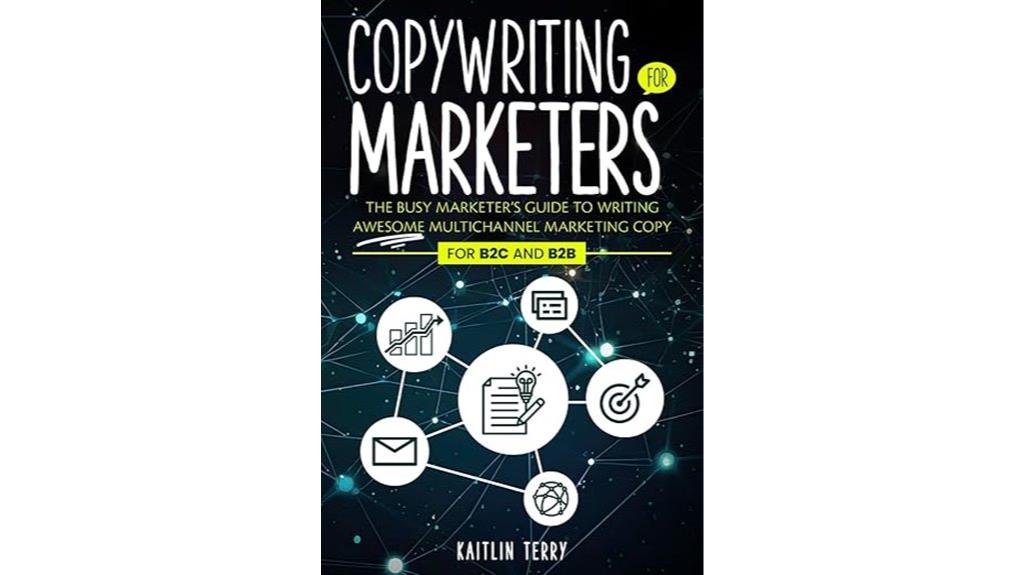
If you’re a busy marketer looking to sharpen your multichannel copywriting skills, “Copywriting for Marketers” is the perfect guide to help you craft compelling content across email, social media, blogs, and websites. I find its clear, accessible language makes complex concepts easy to understand, even without industry jargon. The book emphasizes research, focus, and dedicated effort, which are essential for success. Its step-by-step strategies, real-life examples, and practical tips make it immediately applicable. Whether you’re new or experienced, this resource boosts confidence and improves results, transforming your campaigns into more engaging, effective marketing efforts across all channels.
Best For: busy marketers, small business owners, and marketing teams seeking practical, easy-to-understand strategies to improve their multichannel copywriting skills.
Pros:
- Clear, accessible language that simplifies complex concepts without industry jargon
- Practical, actionable tips and step-by-step strategies that can be applied immediately
- Covers a wide range of channels including email, social media, blogs, and websites for comprehensive learning
Cons:
- Some readers may find certain sections (like B2B/B2C distinctions) initially challenging or slightly confusing
- As a dense resource, it requires dedicated time and focus to fully absorb and implement the strategies
- Might be less suitable for advanced copywriters looking for highly specialized or niche techniques
Copywriters Handbook
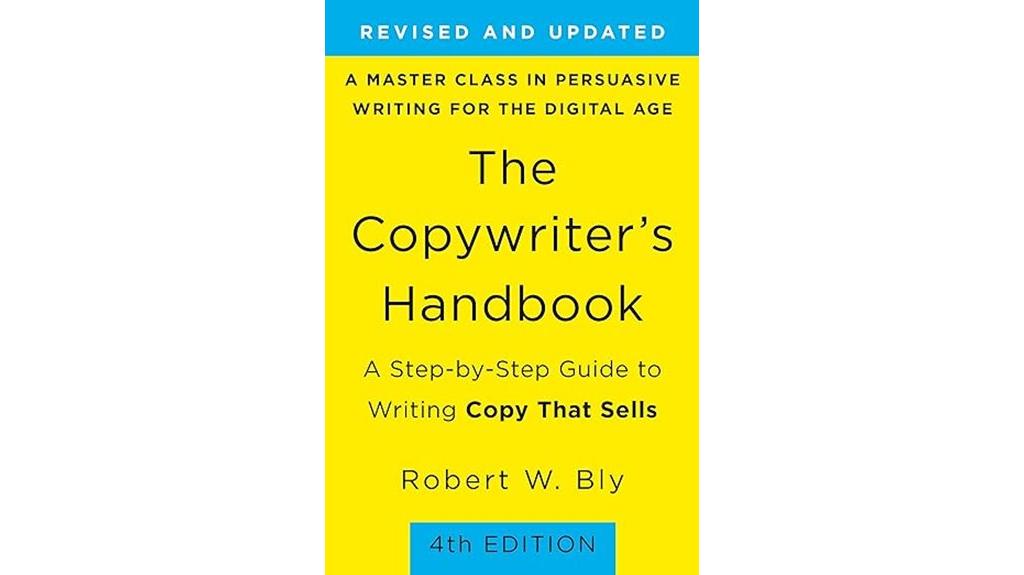
The Copywriters Handbook stands out as an essential resource for both beginners and experienced marketers who want clear, practical guidance on crafting persuasive sales copy. I’ve found it incredibly helpful for breaking down complex concepts into simple language, making it easy to understand and apply. The book covers a wide range of topics like email, websites, funnels, and online marketing strategies, with actionable tips, checklists, and examples. Its straightforward approach helps improve your writing quickly, boosting your sales conversions. Whether you’re just starting out or refining your skills, this book provides a solid foundation to elevate your copywriting and marketing results.
Best For: beginners and experienced marketers seeking clear, practical guidance to craft persuasive sales copy and improve their online marketing results.
Pros:
- Easy-to-understand language making complex concepts accessible
- Practical tips, checklists, and examples to enhance writing skills quickly
- Comprehensive coverage of digital marketing topics like email, websites, and funnels
Cons:
- May offer limited new insights for seasoned marketing professionals
- Lacks in-depth strategies for advanced copywriting techniques
- Focuses primarily on foundational principles, which might not satisfy expert needs
The Adweek Copywriting Handbook

For marketers seeking a practical, step-by-step guide to mastering sales copy, The Adweek Copywriting Handbook stands out as an essential resource. Written by Joseph Sugarman, it offers clear, logical instructions that guarantee results, especially for beginners. The book focuses on crafting compelling sales letters and ads, with real examples and detailed analysis. Its user-friendly design includes space for notes, making it easy to internalize techniques. Many readers report significant sales improvements after applying Sugarman’s psychological triggers and proven methods. Whether you’re new or experienced, this handbook deepens your understanding of persuasive copy and elevates your marketing skills to the next level.
Best For: beginners and experienced marketers seeking a clear, practical guide to writing persuasive sales copy and improving sales results.
Pros:
- Provides step-by-step instructions that guarantee results, especially for those new to copywriting
- Uses real examples and detailed analysis to facilitate understanding and application
- User-friendly layout with notes space, making it easy to internalize techniques and concepts
Cons:
- Primarily focused on print advertising, which may require adaptation for digital or multimedia platforms
- Some techniques might be considered dated, requiring updates for modern marketing channels
- The depth of technical detail may be overwhelming for complete beginners without prior marketing knowledge
Scientific Advertising

“Scientific Advertising” stands out as a must-read for marketers who want to base their strategies on proven principles rather than guesswork. Even in 2025, its core ideas—tracking results, measuring effectiveness, and understanding consumer response—remain essential. Claude Hopkins’s timeless advice on testing campaigns and eliminating waste is more relevant than ever, especially with today’s digital tools. The book encourages data-driven decisions, helping marketers refine their efforts and maximize ROI. Despite some outdated language and typos in older editions, the fundamental lessons about testing, targeting, and measurement continue to shape modern advertising. It’s a foundational read for anyone serious about marketing success.
Best For: marketers, copywriters, and business owners seeking a foundational understanding of advertising principles rooted in data-driven testing and measurement.
Pros:
- Timeless principles that remain relevant over a century after publication.
- Emphasizes the importance of tracking results and eliminating waste for better ROI.
- Provides practical, straightforward advice that can be applied to both traditional and digital marketing campaigns.
Cons:
- Outdated language and occasional typos in older editions can detract from readability.
- Some readers find the style simplistic or underdeveloped, wishing for more detailed examples.
- The book lacks modern statistical data and case studies, which may limit its application to current digital marketing strategies.
Copywriting Secrets Book: Use Words to Boost Clicks, Sales & Profits
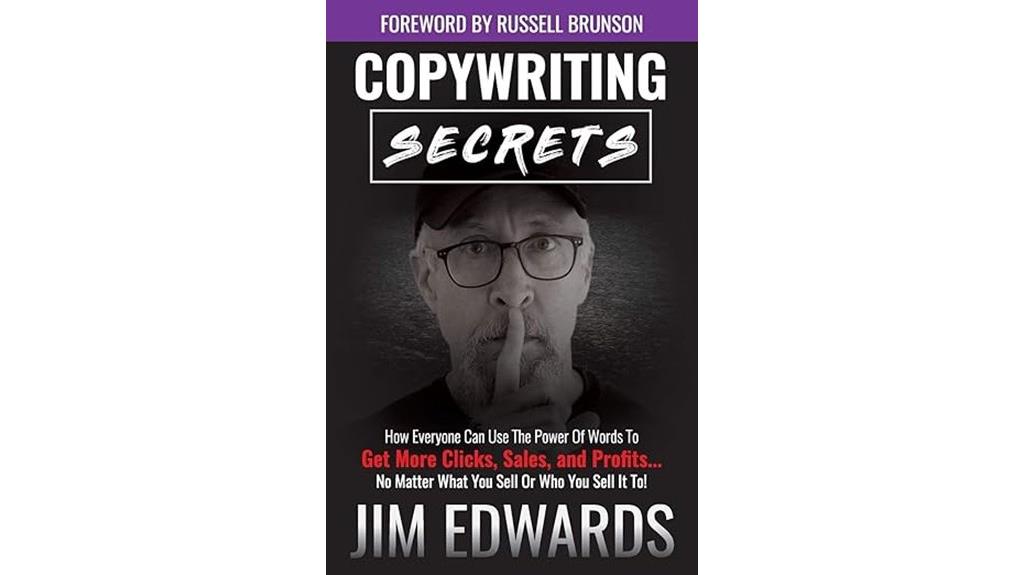
If you’re new to copywriting or looking to sharpen your skills quickly, Jim Edwards’ “Copywriting Secrets” stands out as an engaging, straightforward resource. Its humorous, accessible style makes learning fun and easy to grasp, even for non-native English speakers. The book offers practical, step-by-step guidance with real-world examples on headlines, calls-to-action, and persuasive writing. Designed for beginners and marketers alike, it emphasizes actionable tips you can apply immediately. While it’s mostly beginner-focused and slightly promotional, Edwards’ honest, no-fluff approach makes it a valuable starting point to boost clicks, sales, and profits through powerful words.
Best For: beginners, marketers, and entrepreneurs seeking practical, easy-to-understand copywriting guidance to boost clicks and sales.
Pros:
- Engaging and humorous style makes learning enjoyable and accessible.
- Provides clear, step-by-step instructions with real-world examples.
- Focuses on actionable tips that can be applied immediately to improve marketing results.
Cons:
- Primarily aimed at beginners, with limited coverage of advanced psychological strategies.
- Contains some repetitive content that may affect the overall flow.
- Slightly promotional tone toward certain software tools, which may reduce perceived impartiality.
All Marketers Are Liars Book
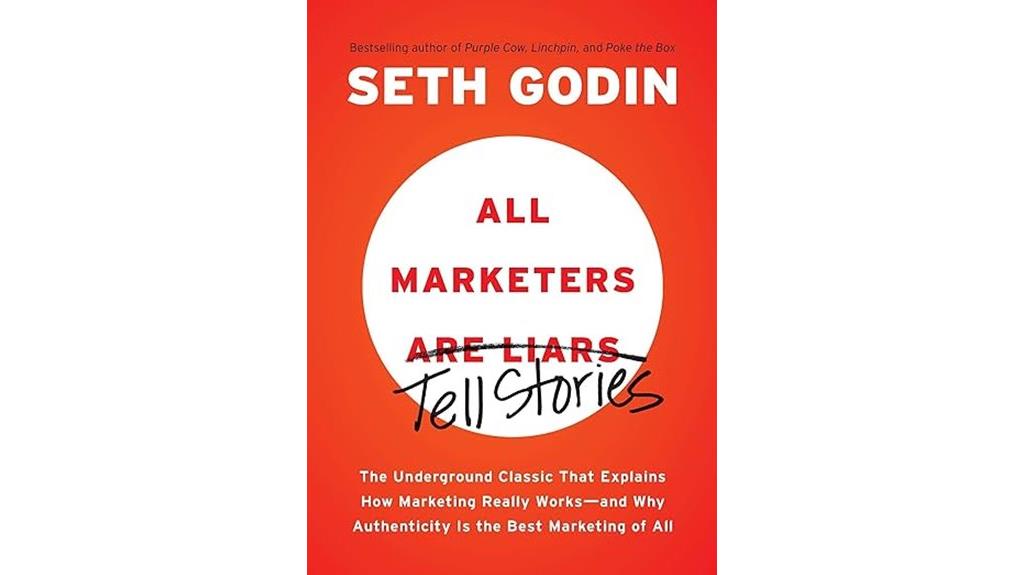
All Marketers Are Liars offers a compelling perspective for marketers who want to build trust through authentic storytelling. Seth Godin emphasizes that genuine marketing relies on honesty, creating stories that are true and trustworthy. The book warns against superficial tales designed solely to sell, urging marketers to focus on integrity and real engagement. It highlights how consumers often deceive themselves, and successful marketing exploits these biases. By understanding consumer psychology and prioritizing authentic interactions, marketers can foster loyalty and long-term relationships. This book challenges us to rethink storytelling, emphasizing that honesty and trust are the real keys to marketing success.
Best For: marketers, business leaders, and consumers seeking to understand the importance of authenticity and trust in effective storytelling and marketing.
Pros:
- Emphasizes the value of honesty and integrity in building lasting customer relationships
- Offers practical insights into consumer psychology and self-deception to improve marketing strategies
- Promotes authentic engagement that can foster long-term loyalty and societal trust
Cons:
- May challenge traditional sales tactics that rely on persuasive or exaggerated stories
- Requires a genuine commitment to transparency, which can be difficult in competitive markets
- Some readers might find the emphasis on authenticity less immediately actionable compared to more tactical marketing advice
Ogilvy on Advertising
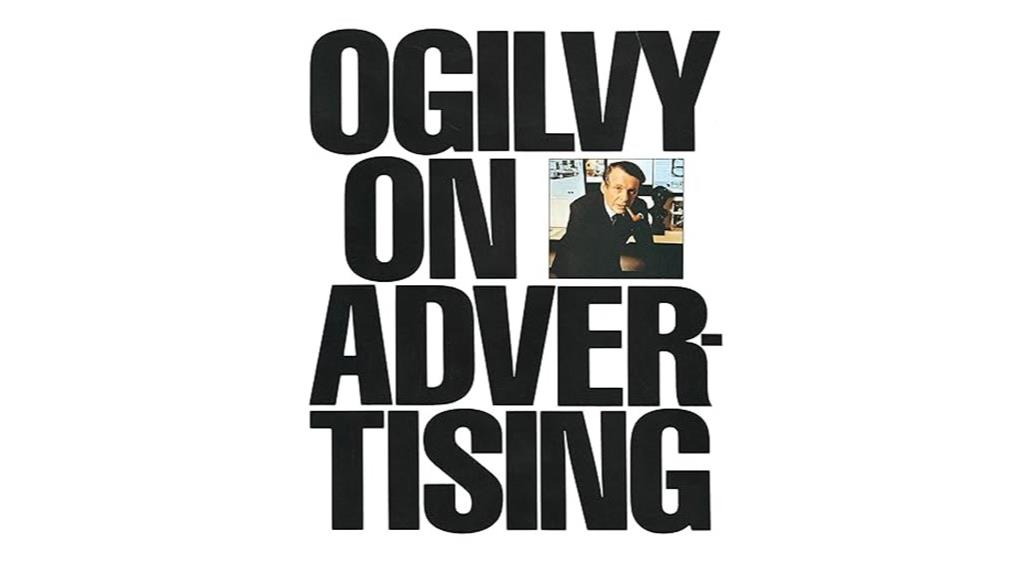
Ogilvy on Advertising is a must-read for marketers who want timeless insights into effective advertising. I find his principles still relevant today, emphasizing that human nature remains constant. Ogilvy advocates for giving products personality, using facts over hype, and including the brand name in headlines to boost visibility. He stresses that advertising’s main goal is to sell, and creativity should serve that purpose. His advice on simple design, long copy, and research-backed messaging helps craft campaigns that genuinely connect with consumers. Ogilvy’s timeless wisdom makes this book a foundational resource for anyone serious about creating impactful, honest advertising.
Best For: marketers, advertising professionals, and business owners seeking timeless, research-backed strategies to craft honest, effective, and impactful advertising campaigns.
Pros:
- Provides foundational principles rooted in human nature and consumer psychology that remain relevant across eras.
- Emphasizes clear messaging, honesty, and simplicity, fostering trust and genuine connections with consumers.
- Offers practical advice with real-world examples, making complex advertising concepts accessible and actionable.
Cons:
- Some strategies may need adaptation for digital and social media platforms beyond traditional media.
- The emphasis on long copy and detailed research might be less suitable for fast-paced, short-form digital campaigns.
- As a classic text, certain examples and industry context may feel dated to modern audiences.
How to Write Copy That Sells Book

How to Write Copy That Sells by Ray Edwards stands out as an essential resource for marketers enthusiastic to craft persuasive, ethical copy that genuinely connects with their audience. This book offers a clear, step-by-step system centered on the P.A.S.T.O.R. formula—Person, Amplify, Story, Transformation, Offer, Response—that helps structure compelling messages. It emphasizes authentic persuasion without tricks or guilt, focusing on delivering real value. Whether you’re a beginner or seasoned pro, the practical guidance on headlines, bullet points, and storytelling boosts engagement and sales. Complemented by a free video course, it’s a powerful tool to improve your communication and drive results confidently.
Best For: marketers, entrepreneurs, and content creators seeking to craft persuasive, ethical copy that boosts sales and engagement across various communication channels.
Pros:
- Provides a clear, step-by-step framework using the effective P.A.S.T.O.R. formula.
- Emphasizes authentic, value-driven persuasion without manipulative tactics.
- Includes practical tips, summaries, and a free video course to enhance understanding and application.
Cons:
- Limited examples of B2B or tangible product copy, focusing mainly on services and coaching.
- Some readers may find the metaphors and references less resonant or a bit unconventional.
- The conclusion is somewhat weak, providing less actionable guidance for long-term mastery.
Write on Target: The Direct Marketers Copywriting Handbook

Are you looking to sharpen your direct marketing copy skills and produce campaigns that truly convert? Write on Target: The Direct Marketers Copywriting Handbook by Donna Baier Stein and Floyd Kemske offers practical, actionable advice for both beginners and seasoned pros. It explains what effective copy is—and isn’t—and features real-world examples from letters, brochures, ads, and online media. The book emphasizes clarity, design, and response-driven messaging across multiple channels, including direct mail, print, radio, and the internet. With its checklists and insights, it’s a valuable resource for anyone looking to craft compelling, high-impact copy that drives results.
Best For: both novice and experienced direct marketers, copywriters, and marketing professionals seeking practical guidance to craft compelling response-driven copy across multiple media channels.
Pros:
- Provides comprehensive, real-world examples from various media formats to inspire effective copywriting.
- Offers practical checklists and actionable tips that can be applied immediately to improve campaigns.
- Covers multiple channels including direct mail, print, radio, and online media, reflecting the evolving marketing landscape.
Cons:
- Some readers may find the content more focused on traditional direct mail and less on newer digital marketing tools.
- The book assumes a basic understanding of marketing principles, which might be challenging for complete beginners.
- Certain examples and strategies may require adaptation to fit specific industry niches or target audiences.
Copywriting Strategies: A No-Nonsense Guide to Writing Persuasive Copy
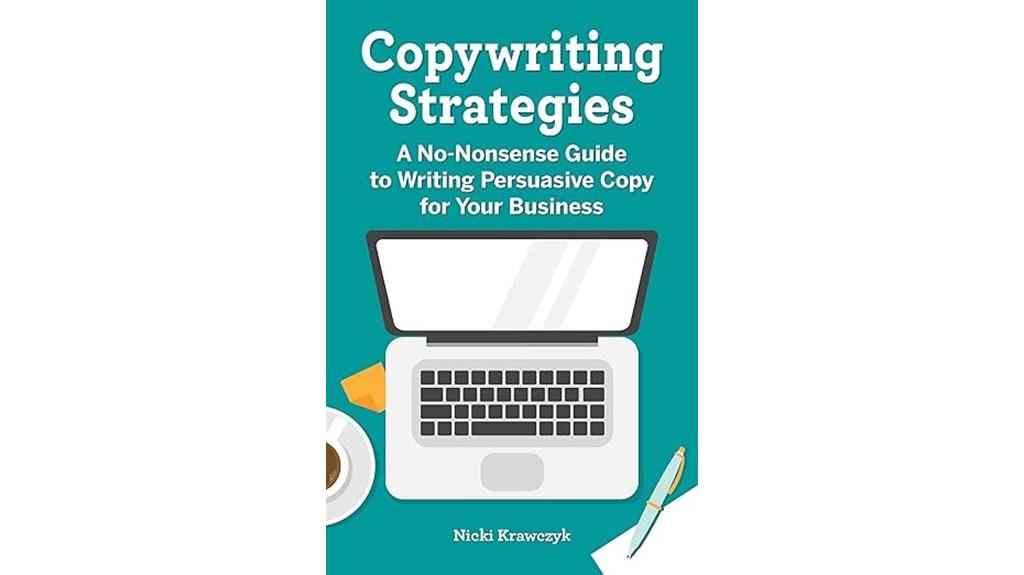
If you’re new to copywriting or looking to sharpen your persuasive skills, this guide offers straightforward, practical strategies that anyone can grasp and apply immediately. It focuses on core techniques, basic principles, and easy-to-follow instructions, making complex concepts digestible. Designed for beginners, entrepreneurs, and marketing pros, it helps you craft compelling copy, understand essential terminology, and build confidence. The book’s friendly, step-by-step approach ensures you can implement strategies right away to improve your messaging. Whether you want to write better product descriptions or manage copywriters effectively, this no-nonsense guide is a valuable resource you’ll want to revisit often.
Best For: beginners, entrepreneurs, and marketing professionals seeking practical, easy-to-understand copywriting strategies to improve their persuasive writing skills.
Pros:
- Clear, step-by-step instructions that are easy to follow and implement immediately
- Focuses on fundamental principles and core techniques suitable for beginners and experienced marketers alike
- Highly recommended as a team resource, often purchased in multiples for training purposes
Cons:
- May be less relevant for advanced copywriters looking for sophisticated or niche strategies
- Some readers find it less engaging for social media content or highly creative copy needs
- The straightforward approach might feel too basic for those seeking in-depth or highly technical copywriting insights
Cashvertising: How to Use 100+ Ad Psychology Secrets to Sell Anything
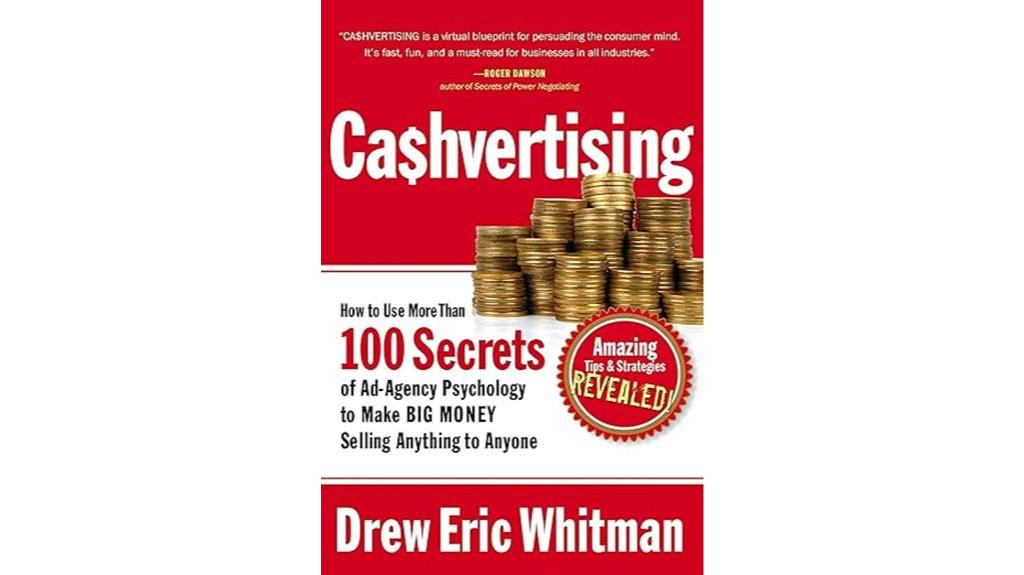
Cashvertising is a must-read for marketers and copywriters who want to master the psychology behind effective advertising. I found it incredibly practical, with real studies and step-by-step techniques that I could apply immediately. The book emphasizes simple yet powerful tactics like refining headlines, highlighting benefits, and creating urgency with calls to action. Drew Whitmen’s insights are engaging and easy to understand, making complex concepts accessible. After reading, I instantly improved my ads, boosting engagement and conversions. It’s a valuable resource that transforms how you approach advertising, providing proven psychological secrets to sell anything more persuasively.
Best For: marketers, copywriters, and entrepreneurs seeking to leverage psychological principles to craft more persuasive and effective advertising campaigns.
Pros:
- Practical, step-by-step techniques backed by real studies that can be applied immediately.
- Focuses on simple yet powerful strategies like headlines, benefits, and urgency to boost ad performance.
- Engaging and accessible writing style makes complex psychological concepts easy to understand.
Cons:
- Some readers may find certain techniques require ongoing practice to master fully.
- The book emphasizes psychological tactics, which may not suit all advertising styles or industries.
- As a comprehensive resource, it may be dense for those looking for quick, superficial tips.
Factors to Consider When Choosing Copywriting Books for Marketers

When selecting copywriting books, I always consider how well the content matches my target audience and their needs. I also look at the depth of information and whether it offers practical tips I can apply immediately. Finally, I check the author’s credibility and make sure the format suits my learning style.
Target Audience Relevance
Choosing the right copywriting book starts with understanding your skill level, marketing channels, and industry focus. I look for books tailored to my experience—whether I’m a beginner needing foundational tips or an expert seeking advanced strategies. It’s essential that the content matches my primary channels, like email, social media, or websites, so I can apply what I learn directly. I also consider whether the examples and language resonate with my industry, whether B2B, B2C, or e-commerce. A relevant book will address the specific challenges I face and provide practical, actionable strategies aligned with my goals. Ensuring the material suits my professional context boosts my confidence and helps me craft more compelling, effective campaigns.
Content Depth Level
Selecting the right copywriting book depends heavily on understanding its depth and how well it matches your experience level and goals. If you’re a beginner, look for books that provide a solid overview and actionable steps, including examples and checklists, to build your foundation. More advanced marketers should seek resources that explore sophisticated techniques, industry-specific strategies, and technical details like data insights or psychological triggers. Consider whether the content balances theory with practical application—are there real-world case studies or templates? Your goals matter too; if you want to master multichannel copy or data-driven campaigns, choose books that match that focus. Ultimately, the depth should challenge you appropriately while equipping you with the skills to elevate your campaigns.
Practical Application Focus
To get the most out of a copywriting book, I focus on resources that deliver actionable strategies, checklists, and real-world examples. I seek books that emphasize step-by-step processes and practical tips, which make it easier to apply concepts immediately. Exercises or prompts that encourage hands-on practice are essential, as they help me experiment with different techniques and refine my skills. I also prioritize books covering multiple channels and formats, so I can adapt my copywriting to diverse platforms like email, social media, and landing pages. Finally, I look for resources that highlight measurable results and campaign analysis, enabling me to evaluate the effectiveness of my copy and continuously improve my marketing efforts. Practical application is key to transforming knowledge into impactful campaigns.
Author Expertise Credibility
Have you ever wondered how to gauge the reliability of a copywriting book? The key lies in the author’s expertise and credibility. I look for authors with solid backgrounds in copywriting or marketing, as their experience adds weight to their advice. Recognized industry experts or award-winning writers often share proven strategies and innovative techniques validated through real-world results. Authors with multiple publications or contributions to reputable marketing outlets demonstrate sustained mastery. Credentials such as marketing degrees, certifications, or professional affiliations further boost their authority. When an author has a history of successful campaigns or teaching, I trust their guidance more, knowing it’s backed by tangible results and deep knowledge. These factors help ensure I invest time in books that truly elevate my marketing skills.
Media Format Compatibility
When choosing a copywriting book, considering the media format becomes just as important as evaluating the author’s expertise. You want a format that fits your learning style and reading habits—whether print, ebook, or audiobook. Digital versions often include interactive features, hyperlinks, or multimedia elements that can boost understanding and engagement. Make sure the format is compatible with your devices, like Kindle, iOS, Android, or PDF readers, to avoid technical issues. Also, check if the format allows for highlighting, note-taking, or annotations, which help with review and application. Remember, audiobooks are great for passive learning, while print and ebooks excel for detailed study and quick referencing. Choosing the right media format enhances your learning experience and makes applying copywriting concepts easier.
Updated and Current
Choosing a copywriting book that’s truly current is essential in today’s rapidly evolving digital marketing landscape. With new platforms, tools, and consumer behaviors emerging constantly, your resources need to reflect these changes. Look for books that incorporate the latest trends, such as multichannel strategies across social media, email, and content marketing. Verify that the content is updated with current best practices, recent case studies, and relevant data. It’s also important to choose resources addressing mobile-first engagement and data-driven personalization, which are now central to marketing success. Additionally, check the publication date or edition to ensure it covers emerging technologies and digital advertising regulations. Only then can you be confident you’re learning the most relevant, actionable strategies for today’s competitive environment.
Frequently Asked Questions
How Do These Books Cater to Different Marketing Industries?
These books cater to different marketing industries by offering versatile strategies that can be tailored to specific audiences. I find they provide practical insights whether you’re in digital, content, or traditional marketing, helping me craft compelling messages across platforms. They emphasize understanding customer psychology and adapting techniques accordingly, so I can elevate my campaigns regardless of the industry. This flexibility makes them invaluable resources for any marketer aiming to succeed.
Are the Strategies in These Books Suitable for Digital and Offline Campaigns?
Absolutely, the strategies in these books work well for both digital and offline campaigns. I’ve found that timeless principles like compelling storytelling and clear calls to action translate across platforms. Coincidentally, what I learn from these books often sparks ideas that I can adapt quickly, whether I’m crafting a social media ad or a print brochure. These strategies are versatile, making them perfect for any marketing environment I immerse myself in.
Can These Books Improve My Overall Marketing Communication Skills?
Absolutely, these books can boost your overall marketing communication skills. I’ve found that they teach you how to craft compelling messages, understand your audience better, and write persuasively across different channels. By applying the techniques, I’ve improved my clarity and engagement in both digital and offline campaigns. They’re practical, insightful, and perfect for anyone looking to elevate their communication game and connect more effectively with prospects and customers alike.
Do These Books Include Actionable Exercises or Practical Examples?
Absolutely, these books don’t just talk the talk—they walk the walk. They’re packed with actionable exercises and real-world examples that you can implement immediately. I’ve found that applying these practical tips helps me sharpen my skills and see quick results. Think of them as your secret weapon; they’ll help you turn theory into practice and truly elevate your marketing campaigns. You’ll be surprised how fast you see progress!
How Often Should I Revisit These Books to Stay Updated?
I recommend revisiting these books every few months to keep the ideas fresh and relevant. Copywriting trends evolve, and regular review helps me stay sharp and inspired. I also revisit specific sections when working on new campaigns to apply fresh insights. Consistent exposure guarantees I don’t forget key principles and keeps my skills sharp, so I can craft compelling messages that truly resonate with my audience.
Conclusion
Remember, a good copy can make or break your campaign. These books are your secret weapons to mastering persuasive writing and boosting results. Immerse yourself in them with an open mind, and you’ll see your marketing efforts transform. As the saying goes, “The pen is mightier than the sword”—and in marketing, your words hold incredible power. So, pick one today and start crafting copy that truly converts!









